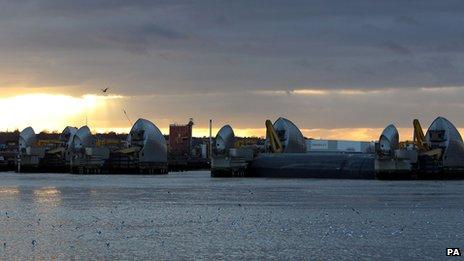Thames Barrier engineer says second defence needed
- Published

Last month the Thames Barrier was closed due to flooding for the first time in two years
A civil engineer who was part of the project management team which completed the Thames Barrier has said a new river defence should be planned urgently.
Dr Richard Bloore said the south-east London barrier, opened in 1982, was not designed to factor in global warming.
A study, external by the Environment Agency says with some modifications the barrier could continue to provide protection for the rest of the century.
In December it closed to counter floods for the first time in two years.
Second barrier needed
2012 was the UK's second wettest year on record.
Last month, some homeowners in the Thames Valley were affected by drainage flooding for more than 10 days.
Dr Bloore said: "The Thames Barrier was built in response to the floods in 1953.
"Nobody had heard of global warming then."
He said based on projections allowing for increased settlement, water extraction and rising sea levels, the barrier was built to withstand a one-in-1,000-year North Sea surge occurring by 2030.
He said: "Six months ago, who would have thought New York would be flooded? If it can happen on an island of rock, it would be disastrous if it happened in our clay basin."
Hurricane Sandy caused a record surge of seawater in New York City in October, flooding subway and road tunnels and leaving much of Lower Manhattan without power.
'World class protection'
Dr Bloore, who lives near a tributary of the Thames in Twickenham, south-west London, experienced flooding before the barrier was built.
He said although the barrier had proved an effective defence, a tidal barrier was needed further downstream.
He said: "If I were making the decisions I would be thinking about the alternatives."
In November, the Environment Agency set out its six-year study, Thames Estuary 2100.
The report said the existing barrier provides a greater degree of protection than originally anticipated.
The agency said worse case scenarios, including the contribution of polar ice melt and thermal expansion, could result in much higher levels occurring but these were now thought to be unlikely.
A spokesman said major changes including a new barrier were unlikely until 2070 as it was expected the defence could meet its design protection level - against a one-in-1,000-year flood - until then.
He said London enjoyed "world class levels of protection against tidal flooding" and that would continue for many years to come.
Dr Bloore said: "It's all a matter of opinion.
"I think global warming has changed the ball game; obviously the Environment Agency doesn't."
In 2005 Peter Borrows from the Environment Agency told BBC News a second barrier may be needed.
- Published3 January 2013
- Published30 October 2012
- Published30 October 2012
- Published28 December 2012
- Published27 December 2012